shipper
 photo credit: "WonderCon 2015 - Mulder and Scully" by William Tung (CC BY-SA 2.0)
photo credit: "WonderCon 2015 - Mulder and Scully" by William Tung (CC BY-SA 2.0) Definition: (noun) a fan who writes fan fiction about and/or has an attachment to a “real” or imagined romance in a work of fiction
Example: When Jim and Pam finally hooked up on The Office, Myra was in shipper paradise.
Quote:
“All in all, the movie is very shipper heavy and plot light.”
The new X-Files movie, I Want to Believe, comes out today, and the internet has been rife with shipper speculation about where the relationship between principal characters Fox Mulder and Dana Scully will go. During the show’s nine-year run, the heavy sexual tension between the two FBI agents was broken only occasionally. Most of their romantic doings existed in the minds of fans, based on scenes in which the characters touch hands or stare deeply into each other’s eyes.
The word shipper comes from relationship, and though it is not often heard in everyday conversation, it is extremely common in the context of fiction written by fans about their favorite characters.
Fan fiction is a huge phenomenon. There is, for example, a large subculture of people who write their own stories about Harry Potter characters (some of them erotic!) which leads me to explain my unusual definition of this week’s word.
Of course, all relationships in works of fiction are imagined. However, fan fiction often deviates from “real” relationships, by which I mean those that appear in the original work. In a discussion of a fan-written Fred Weasley/Hermione Granger* romance on darkmark.com, a poster says, “I think there are very few things in this impressively huge fandom that have not been shipped, no matter how weird or downright distatesful [sic], so Fred/Hermione is not tremendously out there.”
And some shipper imaginings are more “tremendously out there” than others. Many fan fiction histories cite romantic Star Trek stories between Captain Kirk and Mr. Spock as early examples of the genre. This subcategory of imagined homosexual romances, usually about men, is called slash fiction, and it gets its name from the common notation of such relationships with a slash mark (e.g., Kirk/Spock).
As for I Want to Believe, if the movie is, indeed “shipper heavy,” it may kill any chance for another sequel. Some of the most popular television series are successful because the relationship between the main characters is never consummated. In fact, a long list of shows that “jumped the shark” (stopped being worth watching) did so because they satisfied the shippers’ desire to see their fan fiction romances become “reality.” (You can find an extensive listing of such moments at http://www.jumptheshark.com/forum/Did/27.)
*For my five or six readers who have not yet read Harry Potter (or heard about it endlessly from their children) Fred Weasley and Hermione Granger are characters in that series.



